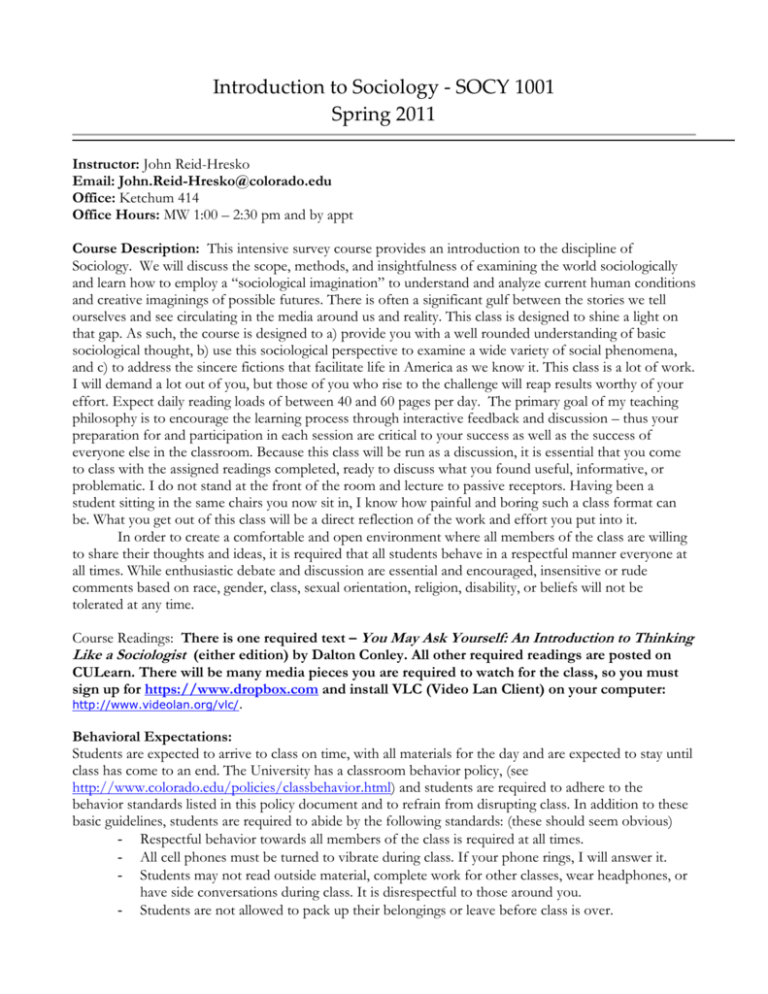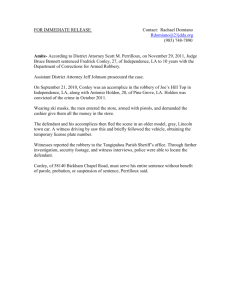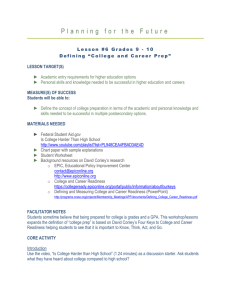Spring 2011
advertisement

Introduction to Sociology - SOCY 1001 Spring 2011 Instructor: John Reid-Hresko Email: John.Reid-Hresko@colorado.edu Office: Ketchum 414 Office Hours: MW 1:00 – 2:30 pm and by appt Course Description: This intensive survey course provides an introduction to the discipline of Sociology. We will discuss the scope, methods, and insightfulness of examining the world sociologically and learn how to employ a “sociological imagination” to understand and analyze current human conditions and creative imaginings of possible futures. There is often a significant gulf between the stories we tell ourselves and see circulating in the media around us and reality. This class is designed to shine a light on that gap. As such, the course is designed to a) provide you with a well rounded understanding of basic sociological thought, b) use this sociological perspective to examine a wide variety of social phenomena, and c) to address the sincere fictions that facilitate life in America as we know it. This class is a lot of work. I will demand a lot out of you, but those of you who rise to the challenge will reap results worthy of your effort. Expect daily reading loads of between 40 and 60 pages per day. The primary goal of my teaching philosophy is to encourage the learning process through interactive feedback and discussion – thus your preparation for and participation in each session are critical to your success as well as the success of everyone else in the classroom. Because this class will be run as a discussion, it is essential that you come to class with the assigned readings completed, ready to discuss what you found useful, informative, or problematic. I do not stand at the front of the room and lecture to passive receptors. Having been a student sitting in the same chairs you now sit in, I know how painful and boring such a class format can be. What you get out of this class will be a direct reflection of the work and effort you put into it. In order to create a comfortable and open environment where all members of the class are willing to share their thoughts and ideas, it is required that all students behave in a respectful manner everyone at all times. While enthusiastic debate and discussion are essential and encouraged, insensitive or rude comments based on race, gender, class, sexual orientation, religion, disability, or beliefs will not be tolerated at any time. Course Readings: There is one required text – You May Ask Yourself: An Introduction to Thinking Like a Sociologist (either edition) by Dalton Conley. All other required readings are posted on CULearn. There will be many media pieces you are required to watch for the class, so you must sign up for https://www.dropbox.com and install VLC (Video Lan Client) on your computer: http://www.videolan.org/vlc/. Behavioral Expectations: Students are expected to arrive to class on time, with all materials for the day and are expected to stay until class has come to an end. The University has a classroom behavior policy, (see http://www.colorado.edu/policies/classbehavior.html) and students are required to adhere to the behavior standards listed in this policy document and to refrain from disrupting class. In addition to these basic guidelines, students are required to abide by the following standards: (these should seem obvious) - Respectful behavior towards all members of the class is required at all times. - All cell phones must be turned to vibrate during class. If your phone rings, I will answer it. - Students may not read outside material, complete work for other classes, wear headphones, or have side conversations during class. It is disrespectful to those around you. - Students are not allowed to pack up their belongings or leave before class is over. Both students and faculty are expected to abide by the University’s Honor Code, which can be found at the following website: http://www.colorado.edu/academics/honorcode/. Cheating and plagiarism are taken very seriously and will result in a failing grade for the course. Disability Statement: If you qualify for accommodations because of a disability, please submit a letter from Disability Services to me within the first four days of class. It is your responsibility to contact Disability Services and arrange for a letter to be provided to you. You can contact Disability Services at: 303.492.8671, Willard 322, www.colorado.edu/disabilityservices Other Obligations: Every reasonable effort will be made to fairly deal with students who, because of religious obligations, participation in athletics or other structured activities, have just cause to request assistance coping with conflicts with attendance or assignments. All students to whom this applies must contact me in writing beforehand listing specific obligations and dates within the first two weeks of class. Forgetting to do so is not a valid excuse. No late reading responses, applications, or exams will be given or accepted except in the most extraordinary circumstances. Course Objectives: You will be given the opportunity to meet and achieve these benefits from your participation in this course, and I will be looking for how well you demonstrate your abilities with respect to these objectives in my final evaluation of your performance in this course. If we both are successful in this course you will: develop the ability to see individual (including your own) choices and situations in a larger social context of trends, history, culture, and structure-appreciating the influence of social forces on individual circumstances (this is the definition of a sociological imagination); gain an understanding of the different theoretical perspectives and important concepts utilized within sociology; practice the application of your sociological imagination and the various theoretical perspectives for a richer understanding of your self (your values, choices, beliefs), people, relationships, inequality, societies, and see possibilities for social transformation; have the opportunity to improve your test taking, study, and writing skills through practice on the evaluation components and individual coaching from your instructor; demonstrate your understanding of course material and your ability to meet academic standards of excellence on the papers, exams, and in discussions. Evaluation Components: Your grade and performance in the class will be measured in a variety of ways. There will be no in-class exams during the class. First, here will be 7 short, two question, impromptu quizzes given in class. Individually, these will not be worth very much, but cumulatively they will be worth 20% of your grade. Each quiz will be worth 10 points, for a total of 70. Secondly, you are required to complete five of the nine possible application activities. These exercises, which will be explained further in class, will require you to consciously engage your own life using sociological ideas, theories, and understandings and to critically reflect on how such a perspective changes interactions and understandings. Each application will be worth 10 points, for a total of 50 points. Third, you are required to write seven critical reading responses during the course. These are to be no more than two double spaced pages and should be critical and engaged responses to the week’s non-textbook required readings, not a book report. The specific content and form of these responses will be outlined in class. Note that these responses may be turned in only on the day the reading is being discussed in class. You may not turn them in early or late. If you choose to write on a day that has more than one assigned reading, your response must address all of the assigned readings, not just one of them. Also, you may only turn in one response per week, which means you will have to write one during seven of the weeks of class. Like the applications, these responses will be graded out of ten points. Fourth, during the middle of the semester, you will be required to write a three to five page paper critically examining the representation of race, class, gender, or sexuality in a series of print/digital advertisements. The specifics of this assignment will be discussed in class. The analysis you write will be between 3 and 5 pages and will be worth 50 points. Fifth, in lieu of a final, you will be required to produce a photo essay. Like everything else, this project will be explained in class. You will turn in a collection of 5 photographs and accompanying text providing sociological insight into the images you have captured. This assignment will be worth 100 points and you will be given two full class periods to devote to working on this project. Sixth, each student will be required to present a portion of material to the class. This assignment, as with the others, will be explained in class. Lastly, attendance and participation over the course of the semester will be worth 50 points. Come to class consistently and say intelligent things and you will do fine here. Point Breakdown: Quizzes Applications Reading Responses Class Presentation Participation Total 70 50 70 25 50 265 pts Here are the standards for earning a percentage or letter grade on any assignment and overall in the course: Letter Grade Percentag e Description Grade A Exceeds all required elements of an assignment, and the quality of the work is considerably greater than what was required. The 90-100 quality of the work is considerably above the class average and impressive to the evaluator. B Meets all required elements of an assignment, and the quality of 80-89 the work is better than what is required and demonstrated by the class average. C 70-79 Meets all required elements of an assignment, no more, no less. Quality of assignment is satisfactory for college level work. D 60-69 Fails to meet all required elements of an assignment, and/or the quality of the assignment is less than satisfactory. F Only meets some of the required elements of an assignment, Less than and/or the quality of the assignment is considerably lower than 59 satisfactory. 50% of points are not guaranteed. At this level points are only given if some elements of the assignment are met. If not, very low percentages are likely. Zero 0 Fails to meet any of the required elements of an assignment, and/or the quality of the assignment is well below basic standards of writing, comprehension, and/or ability to follow instructions; assignment is late or incomplete; assignment is not turned in at all; assignment shows signs of plagiarism or other forms of academic dishonesty. Tentative Schedule Week 1: M 10: Introductions, course policies, and requirements Make sure you can log into CULearn, read the syllabus thoroughly and ask me any questions about class policy, readings, assignments, due dates, and go through Dropbox and VLC. W 12: Thinking Like a Sociologist: Mills “The Promise of Sociology”, Berger “Exploring the Social World,” Henslin “An Overview of Sociology,” Please bring 5 random, small items to class with you F 14: Conley Ch. 1 Application 1: Nothing Personal Due Week 2: M 17: Doing Sociological Research: Henslin “How Sociologists Do Research,” Haney et. al. “Interpersonal Dynamics in a Simulated Prison,” Schuman “Sense and Nonsense about Surveys,” Pager, “Would You Hire an Ex-Convict?” W 19: Jacobs “Doing Research with Streetcorner Crack Dealers,” Duneier “Sidewalk”, Sidewalk (film), Duneier’s Comments on Ethnography (film), and Cornel West’s commentary on Sidewalk (film) F 21: Socialization and the Construction of Reality: Conley Ch. 4 and Becker “On Becoming a Marijuana User” Week 3: M 24: Lorber “‘Night to his Day’: the Social Construction of Gender,” Henslin “On Becoming Male,” Eder “On Becoming Female,” Thorne and Luria “Sexuality and Gender in Children’s Daily Worlds,” and Miner “Body Ritual Among the Nacirema” Application 2: How Uncivilized Due W 26: Culture and the Media: Conley Ch. 3 and Glassner “The Culture of Fear” Week 4: F 28: Giroux and McLaren “Media Hegemony: Towards a Critical Theory of Representation,” Schwoch et al “Television Advertising, Telecommunication Discourse, and popular culture” and Chomsky Manufacturing Consent (film) Application 3: Socialization: Getting Society “Inside” Due M 31: Schwoch “Television News,” OutFOXed (film), and Moyers Buying the War (film) W 2: Natadecha-Sponsel “The Young, the Rich, and the Famous: Individualism as an American Cultural Value,” Caplow “ Rule Enforcement without Visible Means,” Anderson “The Code of the Street,” and Green Street Hooligans (film) F 4: Groups and Social Structure: Conley Ch. 5 and Adler and Adler “Peer Power” Week 5: M 7: Social Control and Deviance: Conley Ch. 6 and Chambliss “The Saints and the Roughnecks” and McLorg and Taub “Anorexia Nervosa and Bulimia” Application 4: It’s the Little Things due W 9: Family Conley Ch. 7 and Cherlin “The Deinstitutionalization of American Marriage” F 11: Religion: Conley Ch. 9 and Jesus Camp (film) Week 6: M 14: Education: Conley Ch. 8 and Klein “The Branding of Learning” W 16: Lowen “The Land of Opportunity,” Lowen “‘Gone With the Wind’: The Invisibility of Racism in American History Textbooks,” Kozol “Savage Inequalities,” and Texas Textbook Revision Articles F 18: Desmond and Emirbayer “Education” Week 7: M 21: Gender and Sexuality: Conley Ch. 12 and Plante “Keyword: Sexualities,” Application 5: Barbie Isn’t Possible Due W 23: Rubin “Thinking Sex,” Kimmel and Pascoe “Dude, You’re a Fag,” Berger “Ways of Seeing” F 25: Fugh-Berman “Tales out of Medical School,” Tannen “Men and Women in Conversation,” Loe “Working At Bazooms: The Intersection of Power, Gender, and Sexuality,” Week 8: M 28: Young et al. “Drinking Like a Guy: frequent Drinking among Undergraduate Women,” Boswell and Spade “Fraternities and Collegiate Rape Culture,” Martin and Hummer “Fraternities and Rape on Campus,” Thompson “A New Vision of Masculinity” W 2: Race: Desmond and Emirbayer “Race in the 21st Century” F 4: Desmond and Emirbayer “The Invention of Race” Week 9: M 7: Lipsitz “The Possessive Investment in Whiteness,” Schlosser “The PrisonIndustrial Complex,” Webb “Dark Alliance” articles, and War on Drugs: America’s Last White Hope film excerpts W 9: Desmond and Emirbayer “Crime and Punishment Application 6: The Privilege Line Due F 11: Bobo “Unmasking Race in Katrina,” Thompson “Katrina’s Hidden Race War,” Lieberman “The Storm Didn’t Discriminate” and Welcome to New Orleans (film http://video.google.com/videoplay?docid=829424674434594989#) Week 10: M 14: Desmond and Emirbayer “Aesthetics” R,C,G,S in Advertisements Essay Due W 16: Photo Essay work day F 18: Photo Essay work day Week 11: --SPRING BREAK-- Week 12: M 28: Authority and Governance: Conley Ch. 11, Lowen “Down the Memory Hole,” and American Blackout (film) W 30: Capitalism: Conley Ch. 10, Domhoff “Who Rules America,” and The Corporation (film) F 1: Klein “New Branded World,” Rizter “The McDonaldization of Society,” Bryman “The Disneyization of McDonald’s,” Application 7: McJobs, McService, McNext, McLife…. Due Week 13: M 4: Cavanaugh and Mander “Design for Corporate Rule,” Cavanaugh and Mander “The Unholy Trinity, and Life and Debt (film) W 6: Military Industrial Complex: SELECTION FROM BOOK COMING AND Why We Fight F 8: Klare excerpts from Blood For Oil Photo Essay Due Week 14: M 11: Klein excerpts from The Shock Doctrine and Iraq For Sale: The War Profiteers (film) W 13: Class and Stratification: Conley Ch. 14, Mantsios “Class in America,” and Mantsios “Media Magic” and Jacobs “Detours on the Road to Equality,” Application 8: Where Did All the Money Go Due F 15: Desmond and Emirbayer “Economics” Week 15: M 18: Poverty: Conley Ch. 15, Ehrenreich “Nickled and Dimed: On (Not) Getting By in America,” and 30 Days: Minimum Wage (film) W 20: Health: Conley Ch. 16 and excerpts from “Broken Promises: Evaluating the Native American Health Care System” F 22: Still Broken: Understanding the American Health Care System and Sicko (film) Week 16: M 25: The Environment and Society: Conley Ch. 17 and Lowen “Progress is Our Most Important Product” W 27: Junger “Blood Oil” and Darwin’s Nightmare (film) F 29: Conley Ch. 18 and we’re done. Application 9: Vision and Action Due






